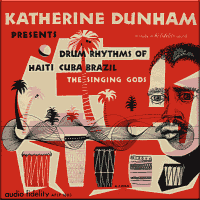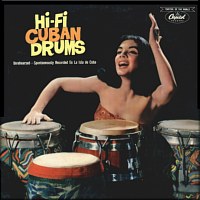Tambores Bata - Afro-Cuban Sacred Drums - Santeria - Cult Music
  |
Africa, of course, is the source of the fascinating rhythms and rituals of Haiti, Cuba, Brasil, Jamaica, Virgin Isles, Trinidad, and coastal Africa itself. The large conga drum has many variants (goombay, etc.) but is essentially a form of the proverbial log with a skin stretched across. The conga, often made from pork or rum barrels if profane, could "talk" across great distances and drive dancers into a frenzy. It was introduced to the Americas in the early sixteenth century by Africans enslaved by the Spanish. Incidentally, the conga line, the first popular Latin dance in North America, stems from the cola, a serpentine carnival march from Cuba. The profane drum handles such mundane tasks as facilitating courtship, war, communication, recreation, etc. The sacred drum, through which the gods sing, is the tool of the priest, and through him, the people sing back to the gods. The beats tell the history and secrets of the cult but primarily lead to ecstatic emotional states. The ritual, drumming, and priest serve to affirm the power, joy, health, and togetherness of the people under the eyes of the ancient gods of Africa. The principal god mentioned in songs from Trinidad to Haiti, including secular calypsos, is Shango, responsible for life and death (and the credibility of the priest who summons him). The sacred drum is more likely than its profane counterpart to be carved elaborately from a tree trunk. In Haiti the peristyle, or rada, drums are baptized by priests and carry mana or secret power. The uninitiated must never touch them, and even among the initiated only the original owner should ever touch them. In a set of three of the basic instruments, each size has a generic name; and there is yet another name used only in ceremonies (in addition to each drum's consecrated name). In the sacred ensembles of Central and South American hill country, the range of percussion instruments extends far beyond the familiar bongos, timbales, and claves of urban, Latin orchestras. Maracas, or the Haitian tchatcha (from which "cha cha cha" may derive), are a profane type of calabash, of which there is a ceremonial form. The specialized, legendary, Cuban bata drums are hourglass-shaped and sometimes were adorned with sacrificial blood and ornaments. And the vaccines of Haiti are bamboo horns which also are struck with small sticks. The greatest variety of instruments belongs to the country with the largest African population outside of Africa: Brasil. The tamborin (tambourine) is used in carnival as well as the annual procession of the semi-deified, regal Maracatú in northern Brasil. Common to all sacred-drum cultures is the use of iron in one form or other. This symbol of wealth and power in old West Africa is, in Haiti, a flattened piece of iron hit with a nail, the cow bell in Cuba, and in Brasil a set of bells hit with a nail or special stick of iron. A band could play without irony, but not without iron. Afro-Cuban cult music, or toques de Santo (including the Yoruba and Lucumi heritage) places the utmost emphasis on drumming. Tambores Bata (sacred drum, or "bata" drummers) are among the most revered Latin percussionists. The records are few and far between, and most of the early ones have achieved cult status in their own right. Some snippets of bata drumming can be found on early Latin records, particularly old 10" LPs with the odd "Afro" or rumba track. And a few major-label albums treat the subject nicely. Katherine Dunham was friends with Fernando Ortiz, chief folklorist and anthropologist studying Cuba. Through him she met and hired into her company the great conga player Francisco Aguabella Urrutia and Julito Besabe Collazo. On The Singing Gods they play bata and a special Nanigo set of drums accompanied by Chyminea Monterrey; Chocolate and Carlitos sing in the African yoruba dialect. |
[Partly] Bata/Santero 10" LPs
| Rating | |
| 8 | Katherine Dunham & Ensemble: Afro-Caribbean Songs & Rhythms 10"; Decca DL-5251; 1950 ("Toitica la Negra") |
| 8 | Thurston Knudson: The Rhythm of Tropic Drums 10"; Tempo TT-2212 |
| 7 | Noro Morales: Rhumba with 10"; MGM E-537 ("Chen Chen Co") |
| 8 | Mongo Santamaria's Afro-Cuban Drum Beaters: Afro Cuban Drums (Voodoo Rituals) 10"; SMC Pro-Arte SMC-535 |
| 8 | Mongo Santamaria & his Afro-Cubans, Featuring Vocalist Silvestre Mendez: Chango 10"; Tico LP-137 (w/Patato Valdez, Willie Bobo..;; on 12" as (1) Chango--Afro-Cuban Drums; Tico LP-1037;; (2) Drums & Chants; Tico LP-1149;; (3) Drums & Chants; Vaya JMVS-56; 1978) |
| 9 | Miguelito Valdes: Latin American Rhythms 10"; MGM E-130 |
| 8 | Miguelito Valdes w/Machito & his Afro-Cubans: Bim Bam Boom--An Album of Cuban Rhythms; Decca DL-5113; (c)1949/1942 |
| 8 | Miguelito Valdes w/Machito & his Afro-Cubans: Afro-Cuban Music; Decca DL-5281; 1942 (78 album A-355) |
| 8 | Uncredited: South American Rhythms 10"; Allegro 4137 |
[Partly] Bata/Santero 12" LPs
| Rating | |
| 7 | Costantino Albini e Daniela Casa: I Sentieri del Mondo--Dall'Alasca Alla Terra del Fuoco; Panda PL-1004 (production; Haitian/voodoo/Santeria/Brasil cult/drum music) |
| 7 | Antobal's Latin All-Stars under the direction of Obdulio Morales: Pachanga & Other Latin Favorites; Coral/Brunswick BL-54104 ("Yemaya"; otherwise known as Antobal's Cuban All-Stars) |
| 7 | Antobal's Latin All-Stars Conducted by Chico O'Farrill: That Latin Beat!; Dot DLP-25445/DLP-3445 (Latin/Afro-Vodun "Voodoo Moon"/Brasil "Playtime in Brazil"; arr. O'Farrill, Peruchin, Rene Hernandez) |
| 8 | Justi Barreto, Grupo folklorico de: Santeria (Toques y Cantos); Gema LPG-1193 (w/Orestes, Graciela, Chocolate, Patato..) |
| 6 | Justi Barretos y sus Santeros: Lovi Ocha; Echu EC-307; 1987/1986 |
| 8 | Candita Batista y sus Tambores Bata: Ritmo de Santo; Maype US-130 |
| 7 | Milton Cardona: Bembe; American Clave AMCL-1004; 1986 |
| 7 | Celina-Reutilio y Gina Martin: Fiesta Santera; SuaRitos S-110 |
| 7 | Celina-Reutilio y Gina Martin: Fiesta Santera Vol. 2; SuaRitos SLP-123 |
| 7 | Tino Contreras: Percusiones Mexicanas--Fantastico Drums & Orchestra Featuring Tino Contreras; Capitol of the World T-10310 ("Rhythm Medley"; rec. in Mexico) |
| -» | Jack Costanzo |
| 6 | Harold Courlander (ed.): Cult Music of Cuba; Folkways P-410; (c)1949 FE-4410 |
| 7 | Celia Cruz: Homenaje a los Santos; Seeco SCLP-9269 |
| 7 | Celia Cruz: Homenaje a los Santos Vol. 2; Seeco SCLP-9281 (con Sonora Matancera) |
| 8 | Celia Cruz: Homenaje a Yemaya; Seeco SCLP-9312 (Vol. 3) |
| 8 | Katherine Dunham Presents Drum Rhythms of Haiti-Cuba-Brazil--The Singing Gods; Audio Fidelity AFLP-1803; c.1956 (w/Chocolate, Aguabella, LaGuerre...) |
| 8 | Preston Epps: Bongo Bongo Bongo; Original Sound OSR-LPS-8851; 1960/1959 ("Call of the Jungle"; mono LPM-5002) |
| 6 | Eru Aña: Afro-Cuban Folklore; RGO 1501 (Florida) |
| Luis Grinan y Orq.: Ritmos Santeros; Kristal KS-1151 | |
| Grupo Folklorico de Cuba: Toques y Cantos de Santos Volumen 1; Cubilandia | |
| 7 | Grupo Folklorico de Cuba: Toques y Cantos de Santos Volumen 2; Cubilandia 513; 1979 |
| 8 | Guem: Possession; Le Chant du Monde LDX-74845; 1985 (France) |
| 7 | The Drums of Cyril Jackson: Afro-Stereo; Counterpoint CPST-5561; 1958 ("Jungla"; made in the West Indies) |
| 5 | Ella Jenkins: Jambo & Other Call-&-Response Songs & Chants; Folkways FC-7661; 1974 ("Yemayah") |
| 8 | Montego Joe: Afro Rhythms; Kimbo Educational KLP-6060; 1970 (kid funk/African/Afro-Cuban/Brasilian/Calypso/Haitian/Santeria) |
| 7 | Montego Joe/Marie Brooks: Ethnic Dances of Black People Around the World; Kimbo Educational KLP-9040 (kid funk/African/Afro-Cuban/Brasilian/Calypso/Haitian/Santeria; 4 treatments of 8 cuts from KLP-6060) |
| Gina Martin; Panart LP-2023 | |
| 8 | Gina Martin: Santero Vol. 2; Panart LP-2097 ("Coro de Cantos Liturgicos Lucumies") |
| -» | Tito Puente |
| 8 | Giraldo Rodriguez y sus Tambores Bata: Afro--Ritmos Afro-Cubanos Tambores Bata; Orfeon Serie Internacional LP-LAB-08 (deluxe Mexican original is gatefold in black-label mono or silver stereo; US version non-gatefold) |
| 8 | Mongo Santamaria's Afro-Cuban Drum Beaters: Afro Cuban Drums (Voodoo Rituals); SMC Pro-Arte (reissues 10") |
| 8 | Tambores Africanos: Despojo-Santero--Santeria Lucumi; Lucumi SLP-711/LLP-711 |
| 8 | Robert Farris Thompson, Jr.: Safari of One--Primitive Rhythms on African Thumbpianos & West Indian Drums; SMC Pro-Arte SMC-1058 (w/Kako) |
| 7 | Carlos "Patato" Valdez: Ready for Freddy; Latin Percussion Ventures LPV-419; 1976 |
| 7 | Carlos "Patato" Valdez: Bata y Rumba; Latin Percussion Ventures LPV-586; 1980 |
| 8 | Miguelito Valdes: "Mr. Babalu"; Mount Vernon Music MVM-140 (repeats some cuts from MGM 10" & Royale 10") |
| 8 | Miguelito Valdes w/Machito & his Afro-Cubans: Cuban Nights; Decca DL-8716; 1957?/1942 (reissues 1/2 of 10" LP DL-5113) |
| 8 | Miguelito Valdes y Machito: Los Reyes del Ritmo/The Kings of Rhythm; Decca DL-4595; 1958?/1942 (reissues 1/2 of 10" LP DL-5113) |
| 7 | Miguelito Valdes with Machito: Reunion; Tico LP-1098 |
| 7 | Miguelito Valdes: Inolvidables; Verve V6-5036 (arr. & cond. Chico O'Farrill; prod. Teddy Reig) |
| 6 | Uncredited: Misa Santeria-Vaudou a Cuba/Voodoo in Cuba; Riviera 521.107 (rec. Maurice Bitter) |
| 8 | Various: African & Afro-American Drums; Folkways FE-4502 (2-LP compilation) |
| 8 | Various: Carnaval a Santiago de Cuba; Le Chant du Monde LDX-A-4250 |
| 7 | Various: Homenaje a Yemaya; Seeco SCLP-9312; 1977 (Celia Cruz, Sonora Matancera, Alberto Beltran, Vicentico Valdes, Daniel Santos, Generosa) |
| 7 | Various: La Pachanga--La Musica de Eduardo Davidson; Panart LP-2048 (w/Obdulio Morales y su Orquesta Tamborees Bata, Fajardo, Sublime, Romeu..) |
| 8 | Various: Santero (Toques de Santo)--Afro-Cuban Cult Music; Panart LP-2060 (Celia Cruz, Mercedes Valdes, Coro Yoruba, Tambores de Bata, etc.) |
| 6 | Various: Three Rituals; Cook 1043 (Shango Sacrifical Ritual, Yemenite Nightsongs, Tumba Francessa from Santiago de Cuba) |
Afro-Brasilian CandombléThe Candomblé ritual was brought by African slaves; African gods (orixás) are equated with Christian figures, for instance Oxalá with Jesus. Hours of drumming induce women of the sect into trances, particularly the "daughter of a saint," who is outfitted for the dances she must perform while under possession. |
[Partly] Afro-Brasilian Candomblé
| Rating | |
| 7 | Costantino Albini e Daniela Casa: I Sentieri del Mondo--Dall'Alasca Alla Terra del Fuoco; Panda PL-1004 (production; Haitian/voodoo/Santeria/Brasil cult/drum music) |
| 6 | Candomblé--Afro-Brasileira (Serie III--Musica Religiosa); Editora Xaua, documentos folclóricos brasileiros |
| 8 | Katherine Dunham Presents Drum Rhythms of Haiti-Cuba-Brazil--The Singing Gods (w/Chocolate, Aguabella, LaGuerre..); Audio Fidelity AFLP-1803; c.1956 |
| 7 | [David Lewiston recorded]: In Praise of Oxalá & Other Gods--Black Music of South America; Nonesuch H-72036 |
| 7 | Mavambo Trio: RWM Aos Orixas--Candomble; Fermata 22.515; 1985 (percussion) |
| 7 | Luiz da Muricoca: Candomble da Bahia; Musicolor LPK-20.113; 1968 |
| 8 | [Luciano Perrone e] Os Ritmistas Brasileiros: Batucada Fantastica; Musidisc 607.6068 or XPL-4 (Batucada Fantastica Bossa Nova; MGM International Music Series SE-4085) |
| Luciano Perrone e os Ritmistas Brasileiros: Batucada Fantastica Vol. II; Musidisc 607.6069 | |
| 9 | Luciano Perrone e os Ritmistas Brasileiros: Batucada Fantastica Vol. III; Musidisc 607.6070 |
| 6 | Conjunto de percussao Dora Pinto (The Dora Pinto Percussion Group); Chantecleer CMG-2071 (all-woman percussion group; features "Sessao de Macumba") |
| 8 | Robert Farris Thompson, Jr.: Safari of One--Primitive Rhythms on African Thumbpianos & West Indian Drums; SMC Pro-Arte SMC-1058 (w/Kako) |
Hyp Records is a 3-part guide: |
Shop Hip WaxSome items above may be available at Hip Wax Hip Wax |
Hyp Records Guide © 1996 Hip Wax